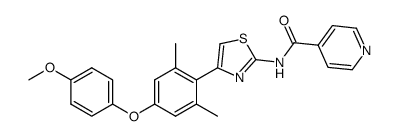1334921-03-7
| Name | N-{4-[4-(4-methoxyphenoxy)-2,6-dimethylphenyl]thiazol-2-yl}pyridine-4-carboxamide |
|---|---|
| Synonyms |
N-(4-(4-(4-methoxyphenoxy)-2,6-dimethylphenyl)thiazol-2-yl)isonicotinamide
TAI-1 |
| Description | TAI-1, an orally active anticancer agent, is a highly potent first-in-class Hec1 inhibitor, with a GI50 of 13.48 nM in K562 cells[1]. |
|---|---|
| Related Catalog | |
| Target |
GI50: 13.48 nM (in K562 cells)[1]. |
| In Vitro | TAI-1 disrupts Hec1-Nek2 protein interaction, leads to Nek2 degradation, induces significant chromosomal misalignment in metaphase, and induces apoptotic cell death[1]. TAI-1 induces cancer cell death through the induction of cleavage of apoptotic proteins Caspase 3 and PARP and degradation of anti-apoptotic proteins MCL-1 and suggests that TAI-1 leads to activation of the apoptotic pathways[1]. TAI-1 is effective in many cancer cells, such as Chronic myeloid leukemia, Cervical cancer, Breast, metastatic-pleural, invasive ductal carcinoma, Acute myeloid leukemia, Myelogenous leukemia, Colorectal carcinoma cells, with GI50 less than 100 nM[1]. |
| In Vivo | TAI-1 (20 mg/kg intravenously IV/ or 150 mg/kg per oral PO/BID) inhibits tumor growth in multiple cancer xenograft models[1]. Animal Model: C.B-17 SCID mice (6-7 weeks, 21-24 g)[1]. Dosage: 20 mg/kg intravenously IV/ or 150 mg/kg per oral PO/BID. Administration: QDx28 cycles. Result: Led to significant tumor growth retardation in Huh-7 and modest tumor inhibition was noted tor the Colo205 and MDA-MB-231 models. Did not lead to any loss in body weight. |
| References |
| Molecular Formula | C24H21N3O3S |
|---|---|
| Molecular Weight | 431.50700 |
| Exact Mass | 431.13000 |
| PSA | 101.58000 |
| LogP | 5.94810 |
| Storage condition | -20℃ |
